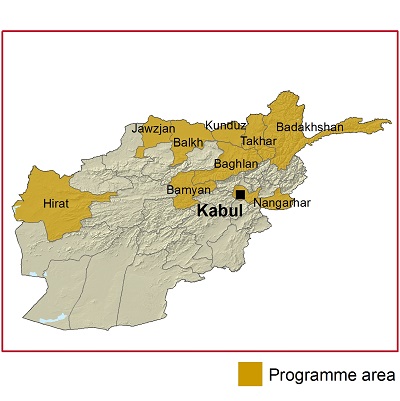Rural Microfinance and Livestock Support Programme
IFAD Asset Request Portlet
Publicador de contenidos
Rural Microfinance and Livestock Support Programme
The grant will help the microfinance sector consolidate the gains it has made in the past few years, despite the difficult context of political and economic instability in the country. IFAD's partners in the programme include the government and the Microfinance Investment Support Facility for Afghanistan (MISFA), an apex institution. Working to establish a network of professional microfinance institutions, MISFA has given hundreds of thousands of Afghans the opportunity to access credit for the first time.
The programme will address the need to meet the remaining demand for rural finance by providing a broader range of financial product services adapted to the needs of smallholders. It will also tackle the issue of currently high interest rates by reducing lending costs and by promoting profitable business models in the livestock sector. The programme targets:
- small-scale farmers and livestock-keepers who have or aspire to have land and/or livestock
- women, particularly women who are heads of households
- resettled or nomadic Kuchi pastoralists
One of the objectives is to help shape policy that facilitates the access of the poorest rural people to microfinance services, promotes models of public-private partnerships in the delivery of livestock extension and veterinary services, and reaches out to nomadic Kuchis.
The programme includes a focus on introducing new and innovative rural financial products and services for rural people who currently have little or no access to microfinance. It will work to ensure that landless people can participate in dairy development and that nomadic Kuchis can access veterinary services. The programme will also pilot-test a model for a public-private partnership in the delivery of public goods and essential veterinary services.
The livestock sector has been for decades a major source of cash income for settled agro-livestock owners, semi-nomadic people and the nomadic Kuchi people. Over recent years, because of drought and the disruption of grazing routes, the number of livestock has decreased sharply. Small poultry flocks that were almost exclusively managed by women have almost disappeared and poor families that kept at least one cow for their subsistence needs are now without animals. Rangeland is overgrazed and conflicts over users' rights hinder improvements in the small ruminant sector.
The programme will work to improve the livestock sector and generate income for poor rural households by supporting:
- small-scale dairy activities in Nangarhar, including milk and fodder production,
- improved livestock nutrition and health services in the Northern region for the benefits of poor cattle owners, nomadic Kuchis and households headed by women
- backyard poultry raising activities, particularly for the benefit of poor women who head households
- dairy goat raising, particularly for poor women in remote and mountainous areas
The programme calls for a first phase of four years, to be followed by a second phase of the duration of four years.
Source: IFAD
